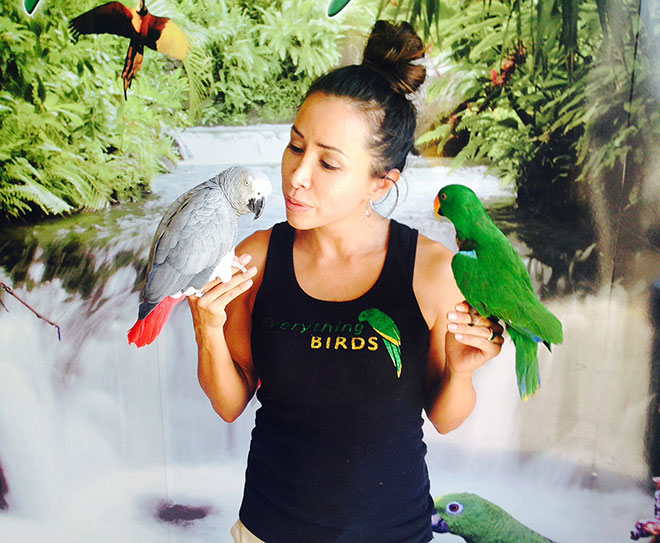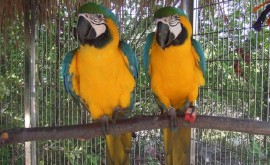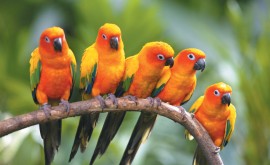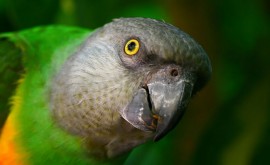 I’m always asked what bird is right for “me or my family”? My common response is a series of questions in no particular order because family dynamics, lifestyle, and what one expects from a companion parrot varies from family to family and species to species.
I’m always asked what bird is right for “me or my family”? My common response is a series of questions in no particular order because family dynamics, lifestyle, and what one expects from a companion parrot varies from family to family and species to species.
nYes! All species of parrots have different wants, needs and expectations too! So having said that when I ask the questions I am more thinking about which parrots would like this person or family best.
Here are my questions and why I ask them:
1. Who lives in the house, if kids, what are their ages?
Kids can be afraid OR a major part of the bird’s upbringing. I have had many customers, adult now, who were raised with their birds. Some inherited their parrots from their parents who have passed. SO if your children aren’t really into the idea of inheriting this new family member to take care of after you are gone you may need to consider a different companion because you will need to put them in your will most likely.
If the children in the house bond very quickly to the baby and the bird becomes “their” bird then when those children go off to college and leave baby behind to be looked after by the parents then one must consider this as a traumatic event so bonding MUST take place with everyone all the time.
Households that have energetic younger kids will need to consider an exotic bird less affected by the noise and energy of lil’ ones. Although, most parrots will adapt to their environment when raised by the family we can recommend species that are most accepting to calm or chaos.
2. What are the work and school schedules?
I ask because I want to know how long will the parrot be in his/her cage or if the person travels for a living. Either case, if it’s an extended amount of time perhaps a companion parrot is not for you. Parrots are flock animals and unless someone is home regularly then it’s difficult for a parrot to feel like a part of a flock or family.
Isolation is not healthy for anyone much less for a parrot. For families with pretty normal school and work schedules the birds can get use to the routine but for those who keep long irregular hours its best to wait when life becomes more routine to accommodate the feeding schedule or a bird’s circadian rhythm (sleep and wake cycle).
A parrot in isolation can become biters or feather pickers from boredom.
3. What are you looking for in a companion parrot?
This is one of the most important questions I feel because it gives me better insight as to what bird would like their wants. If a family or person says we are busy and just want the sights and sounds of a beautiful bird but not likely to be handled much then certain species agree with this lifestyle, i.e. an amazon. grey, or a great-billed parrot.
If one says I want the most cuddly and affectionate the we’d point them in the direction of a cockatoo or macaw. If they say they want low maintenance then we would definitely not recommend a cockatoo! So you see where there are benefits to what a person wants or expects from a companion parrot there are always cons.
At Everything Birds we believe in complete honesty and full disclosure because it’s only fair to these animals that often out live their owners if purchased in your adult years. A very conscience and committed decision is the first place to start in welcoming a parrot into your home as part of your family.
4. Does the family have issues with noise?
Live in an apartment or condo? Someone with sensitivity to noise or repetitive sounds? Sometimes deed restricted communities will also have rules on noise or certain animals.
Some bird’s squawk higher pitch than others so persons with anxiety disorders can’t take certain tones or pitches. I would also ask for asthma or allergies conditions because some parrots produce a lot of powder or dander and others are dander free. The most powdery birds are cockatoos and greys.
5. Do you have any prior experience living with birds or a large parrot?
I ask this because one must know or prepare for the responsibilities of owning birds. It is indeed different than that of a dog or a cat, bonus: we don’t have to walk a bird to do their number ones and twos, and yes they can be potty trained (side note) but engagement, enrichment, involvement and certainly dietary habits will have to be adopted.
If they have no prior experience then we are apt to recommend a lower maintenance parrot that would not have strict dietary needs or needy birds that require constant flock attention. Of course raising your own baby one can adapt to most family’s dynamics, grow and change as the family does but ongoing stimulation for the aging parrot is a constant in his or her life.
Conclusion
So you see we take the decision to own a companion bird with great joy and excitement for the person(s) but also followed by concerns that it’s not a novelty or short term relationship.
Just the opposite, parrots sometimes live up into their 70’s, so we want all our customers to know this truly is a family member for years and years and they bond, fall in love, and adore their human partners.
Through our many talks, workshops, and constant training at the store, when you commit to owning a bird we are committed to that bird and you!




